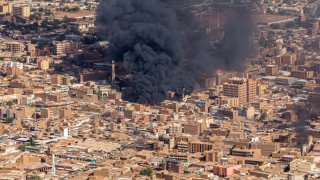Sudan’s Road to Nowhere
The civil war that began in April between rival generals shows no signs of ending.
Equally, narratives about the presence of “fifth columns” within both the army and among citizens circulate intensely among Sudanese. On Sudan TV, a pro-SAF commentator called for “rapid military courts” to “deal with these traitors.”
Even though most Sudanese appear to be still supporting the efforts of the army to fight the RSF, mainly because of its crimes and atrocities, one of the most precarious outcomes of what has happened in Madani is that people, from now on, are likely to reach their own conclusions of the military situation on the ground in their different areas—and take the necessary precautions.
At the moment, large groups of Sudanese are overwhelmingly convinced that they only have themselves to count on to defend their lives, families, property, and lands in this war that they were left to face for eight months. The notion of carrying arms for self-defense, collectively expressed as “popular resistance,” is now consuming Sudanese discourse.
A limited black market for arms had already started within some neighborhoods months ago. These are only likely to grow as the sense of insecurity expands and “popular resistance” becomes more credible.
A Long Road or No Road?
Recently, there have been several conflicting reports that the two men have agreed to have a one-on-one meeting. In a radio interview, the RSF Political Advisor said that Hemedti had sent a written agreement to IGAD expressing the RSF’s readiness to “sit down, negotiate, and reach a clear formula” and that they are “open to a ceasefire.” Reports also said that the army chief had also sent messages that he had accepted to meet the RSF leader.
Both men are products of a regime that was a master in international forum shopping and avoiding international accountability.
Burhan is under intense pressure from the army not to accept any deal that “equates the RSF with the army in any way or puts the two on an equal footing at any level,” according to sources. International pressure might send him to the negotiating table, but he is not likely to sign an agreement the army cannot accept.
It is critical to note here that both Islamists, former regime members, and many in the army leadership are already exceedingly unhappy with the army chief for how he has been managing the conflict on the ground so far. The same applies to some of the army leadership. Any deal that does not get their buy-in could lead to them taking different actions to kill it.
It, therefore, remains to be seen if negotiations between the two men will put an end to the suffering of the Sudanese people, much less clear the path to democracy. The road to change for the Sudanese people was never going to be easy—nor the journey short. But it’s worth asking at this point: is there a road at all?
Nada Wanni is an independent researcher, consultant, and development practitioner focusing on conflict analysis, peacebuilding, governance, and democratization processes. She has worked in academia and civil society and as a consultant to the UN, a number of NGOs, international development organizations, and policy and research institutes. She has worked in Sudan, the Horn of Africa, and the UK.
Image: Abd Almohimen Sayed / Shutterstock.com.

